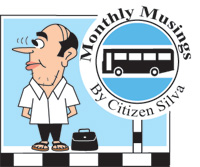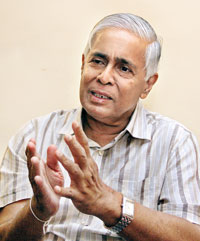Sunday Times 2
Citizen Silva, citizen silva – and the fourth estate
View(s): Being a regular once-a-month columnist for the Sunday Times, I make it a point every Sunday morning when I get my copy of the Times to read and enjoy the writings of my journalist colleagues who write their popular weekly columns. In fact, even before I look at the news section of the paper, I turn to the columns section (as I am sure many of our readers do) to read, mark and inwardly digest these entertaining articles before turning my attention to more mundane matters in the other sections of the papers.
Being a regular once-a-month columnist for the Sunday Times, I make it a point every Sunday morning when I get my copy of the Times to read and enjoy the writings of my journalist colleagues who write their popular weekly columns. In fact, even before I look at the news section of the paper, I turn to the columns section (as I am sure many of our readers do) to read, mark and inwardly digest these entertaining articles before turning my attention to more mundane matters in the other sections of the papers.
So I was most surprised on opening my paper last Sunday to read my colleague Rip Van Winkle (Punchi Putha)’s column and find that he had addressed his weekly message to Citizen Silva. What, I started to ask myself had I, a humble journalist, done to evoke one of Punchi Putha’s cleverly worded pieces that cut errant tall poppies down to size?
It was only after I reached the second paragraph that I realised that Punchi Putha was writing, not to this humble citizen silva, but to a different citizen called Silva – that silver haired and mercurial former chief justice Sarath Nanda Silva who has taken it upon himself in his retirement to challenge the postponement of elections in our courts.
For a moment I felt deflated, coming down to earth with a thud yet thankful that I do not belong to that group of people who earn the odium and scorn of right thinking citizens in their indulgence in politics and podi tricks– and who richly deserve the subtle and not so subtle “hacking” that Punchi Putha delivers every Sunday. I am happy that I can continue, old as I am, in my chosen profession as a member of the fourth estate – a journalist who puts the public interest and the nation’s interest before the government’s partisan interest.

Former chief justice Sarath Nanda Silva
How did this term “the fourth estate” originate to describe the role of journalists who represent the interests of the people in relation to the political and business elites who claim to be doing things for our benefit?
The fourth estate was originally a term of scorn for the ill-principled and scurrilous scribes of the parliamentary press gallery in the British House of Parliament. The conservative Anglo-Irish MP Edmund Burke making a speech in the House of Commons in 1787 coined the phrase as a way of mocking the members of the press he could see seated in the gallery. The traditional three estates of the realm at that time were said to be the clergy, the nobility and the common people, to which Burke added a fourth – journalists or, as we might call them today, the media.
And even in our society today in 21st century Sri Lanka, we have these three estates of the realm – the clergy who pontificate without any real temporal power, the politicians and legislators in the federal parliament, the provincial councils and local councils who, once elected, find it difficult to resist the temptation to behave like the robber barons of old, and the common people whom the clergy and the politicians profess to (but do not always) serve.
It is here that the members of the fourth estate can play a role – drawing attention to and publicising what goes on in the name of “service to the people”.
After all, was it not only the other day that the president himself observed, speaking on the occasion of the issue of a commemorative postage stamp in honour of veteran journalist D.B. Dhanapala, that (I quote) “Journalists have a far more important role to play than politicians or government officials in ensuring a better tomorrow.”?
And the role of us journalists these days is more important than ever.
I cannot help musing about the plight of our ancient King Rajasinghe II who ascended the throne in 1635. He managed to get rid of the Portuguese who were ruling the island at the time by cleverly (or so he thought) allying himself with the Dutch – only to have it taken over by the Dutch on whom he had depended to get rid of the Portuguese.
This gave rise to the well-known Sinhalese saying “Inguru deela miris gatta wagei” (like exchanging ginger for chilli). I cannot help thinking, two years after we the common people voted out Mahinda Rajapaksa’s crowd and exchanged them for Maithripala Sirisena’s crowd that we too have got the kind of bargain that poor Rajasinghe II got for his nation.

